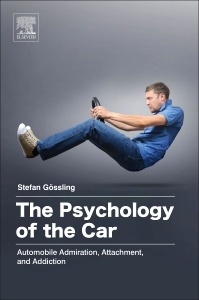Description
The Psychology of the Car
Automobile Admiration, Attachment, and Addiction
Author: Gossling Stefan
Language: English
Subject for The Psychology of the Car:
Keywords
Accidents; Advertisement; Agency; Aggressive driving; Air pollution; Alternative transport futures; Anger; Anxieties; Authority; Automobile order; Automobile rights; Automotive system; Autonomous car; Car bonds; Car culture; Car groups; Car ownership; Car use; Celebrities; Communication; Community; Death; Desirable transport futures; Diplomats; Dominance; Driver-car coidentity; Emotions; Escape; Fear; Formula 1Isle of Man TT; Friction; Gender roles; Governance; Habit; Hormones; Implementation gap; Incentives; Interventions; James Hunt; Masculinity; Membership; Mental illness; Michael Schumacher; Mobility turn; Modal split; Nico Rosberg; Niki Lauda; Obesity; Organization; Personality disorder; Personality; Police; Power; Psychology; Races; Rebellion; Relations; Revenge; Risk; Role models; Self-constructs; Sexuality; Sociality; Sociology; Speed record; Submission; Superiority; Transport behavior; Transport geography; Transport governance; Trauma; Urban transport culture; Vehicle numbers; Violations
Support: Print on demand
Description
/li>Contents
/li>Readership
/li>Biography
/li>Comment
/li>
The Psychology of the Car explores automotive cultures through the lens of psychology with the goal of achieving a low-carbon transport future.
Worldwide there are now more than one billion cars, and their number grows continuously. Yet there is growing evidence that humanity needs to reach ?peak cars? as increased air pollution, noise, accidents, and climate change support a decline in car usage. While many governments agree, the car remains attractive, and endeavors to change transport systems have faced fierce resistance. Based on insights from a wide range of transport behaviors, The Psychology of the Car shows the ?why of automotive cultures, providing new perspectives essential for understanding its attractiveness and for defining a more desirable transport future.
The Psychology of the Car illustrates the growth of global car use over time and its effect on urban transport systems and the global environment. It looks at the adoption of the car into lifestyles, the ?mobilities turn, and how the car impacts collective and personal identities. The book examines car drivers themselves; their personalities, preferences, and personality disorders relevant to driving. The book looks at the role power, control, dominance, speed, and gender play, as well as the interrelationship between personal freedom and law enforcement. The book explores risk-taking behaviors as accidental death is a central element of car driving. The book addresses how interventions can be successful as well as which interventions are unlikely to work, and concludes with how a more sustainable transport future can be created based on emerging transport trends.
1. The Automotive System2. The Psychology of the Car3. Automobile Personalities and (Co)identities4. Feelings, Emotions and the Car5. Automobility, Gender and Sex6. Speed7. Rights, Authority, and the Police8. Community, Friends, and Family9. Risk and Death10. The Clinical Psychology of the Car11. Barriers to Automobile Change12. Sustainable Automotive Futures
Primary audience: Transportation psychology, transportation planning, and urban transportation researchers and upper level and graduate-level students. Secondary audience: Urban transportation practitioners. Tertiary audience: City/state urban and transportation policy-makers
- Features deep analyses of individual and collective psychologies of car affection, moving beyond sociology-based interpretations of automobile culture
- Illustrates concepts using popular culture examples that expose ideas about automobility
- Shows how fewer, smaller and more environmentally friendly cars, as well as low-carbon transport modes, are more socially attractive




